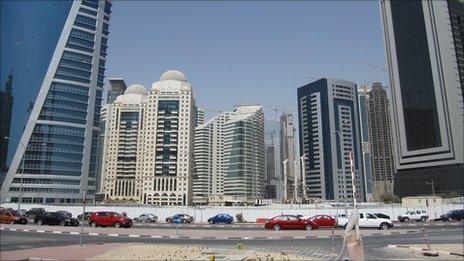Tiny Qatar's growing global clout
- Published

Qatar is one of the smallest - but richest - countries in the world, and has now emerged as a rising star of the Middle East, says The World Tonight's Robin Lustig in Doha.
It is a tiny nation with a population of just 1.7 million inhabitants, only 300,000 of whom are citizens. But put it in a list of countries measured according to per capita income, and Qatar comes top.
Now it could be emerging as a potential leader of the Arab world.
It is the main Arab player in the Nato-led coalition in Libya and has played a major role in trying to resolve regional conflicts.
It also set up the Arabic television news network, al-Jazeera, which has influenced the wave of unrest sweeping through the region.
Earlier this month, Qatar nominated its candidate, Abdul Rahman al-Attiyah, to take over as secretary general of the Arab League, although Egypt has historically monopolised the position. If Mr Attiyah gets the job, it would be a major diplomatic coup.
Vacancy
So how come this tiny nation - once an insignificant pin-prick of land inhabited by a handful of pearl-divers - is now such a major regional force?
The simple answer is that there was a vacancy and Qatar's energetic emir, Sheikh Hamad bin Khalifa al-Thani, decided that his country was well-qualified to fill it.
"We like to be an important player in the region," says his senior adviser, Ibrahim Ibrahim.
"After all, if ever there were to be trouble here, it would engulf everyone, but especially a small country like Qatar.
"Our strategy is to support all decisions made by regional groupings like the Gulf Co-operation Council and the Arab League," he says.
"But we are also prepared to move on our own if we think progress is too slow."
The crisis in Libya is an excellent example of what that can mean in practice.
When the Arab League appealed to the United Nations to put a no-fly zone in place to protect civilians threatened by Col Muammar Gaddafi's forces, Doha took the view that more was needed than just words.
"The Arab League position looked weak," Mr Ibrahim told me. "We were saying to people: 'Go ahead and do it,' but we were not doing it ourselves."
Qatar offered warplanes to the UN-backed military operation and is now reported to be supplying arms to anti-Gaddafi rebels.
Diplomatic prowess
"What are the others putting on the table?" asks Basma Abdelgafar, associate professor of public policy at the Qatar Foundation.
"This is the moment for Qatar to take the lead. It believes in taking a moral position, it thinks for itself, and it has turned itself into a valued international partner."
Qatar certainly seems to have a knack for remaining on good terms with governments which have little in common with each other.
It has cordial relations with both Washington and Tehran, and - even more unusually for an Arab state - with both Israel and its two most implacable enemies, Hamas in Gaza and Hezbollah in Lebanon.
Three years ago, Qatar won praise for brokering a peace deal in Lebanon between rival political factions, ending a long, dangerous stalemate.
In 2009, it negotiated a settlement between the Sudanese government and one of the biggest rebel groups in Darfur. It has previously been active in peace-making in Yemen and mediated in a border dispute between Djibouti and Eritrea.
But Qatari clout extends far beyond mere politics.
It has a world-class Museum of Islamic Art and a purpose-built "Education City" where six leading US universities have campuses. A year ago, it bought one of the best known stores in the world: Harrods of London.
But no matter how influential it becomes, can an absolute monarchy really offer itself as a future leader to Arab states demanding democratic reforms?
Liberal leaning
"People don't realise that Qatar has already been through its own gradual, peaceful revolution," says Prof Abdelgafar.
"But it was a revolution without an 'r' - it was more of an evolution."
Most of Qatar's citizens belong to the strict Wahhabi sect of Islam. However, unlike in Saudi Arabia, women are allowed to drive and followers of other religions are allowed to practise their faith. The first church in Qatar was opened without fanfare three years ago.
It may be that the emir is more liberal than many of his fellow Qataris. Unlike the Saudi royal family, he has managed to establish a political system that is largely independent of religious orthodoxy.
His advisers say his aim is to show that Islam and progress are not incompatible.
But is Qatar no more than a glorified city state temporarily made wealthy by its huge offshore oil and natural gas reserves?
The director of the Brookings Doha Center, Salman Shaikh, says it would be a mistake to underestimate the nation.
"We have already seen how economic and diplomatic power is shifting eastwards," he says. "And Qatar is very much a part of that process."
In 2022, Qatar will host the final stages of the World Cup football competition. That alone is enough to guarantee it a place in the global spotlight.
Robin Lustig reported from Qatar for The World Tonight on BBC Radio 4.
- Published21 April 2011
- Published20 January 2011
- Published27 March 2011
- Published10 May 2011